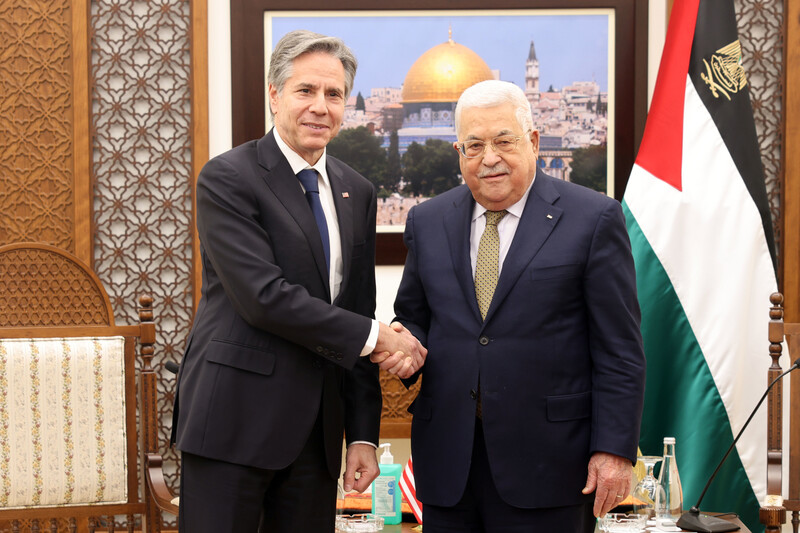Power Suits 2 February 2023

Nothing to see here.
APA imagesYou know a place is in trouble when a US secretary of state is dispatched to speak some home truths.
The current incumbent, Tony Blinken, took two days out of a tight schedule to travel to Egypt and Palestine in an attempt to manage an escalating situation.
His in-tray is otherwise filled with weighty attempts to ensure continued global US hegemony by engineering a Russian defeat in Ukraine without instigating nuclear war, while trying to work out how to deal with a China that is likely to replace the US as the world’s biggest economy in a decade or so.
One must therefore assume that he wielded a certain amount of no-nonsense backdoor diplomacy to enable him to return to these more pressing issues. Because what he said in public amounted to very little.
Reiterating the hollow mantra of “shared values,” Blinken first reassured Benjamin Netanyahu, seemingly Israel’s eternal prime minister, of America’s “iron-clad” commitment to Israel’s security from which the US “never will” waver.
Then, seeking common ground with an Israeli prime minister who has openly declared that only the Jewish people have any rights to the land of Palestine – (ring the apartheid claxon please, it’s those “shared values” again) – Blinken focused on the “destabilizing activities” of Iran, and the Abraham Accords that “chip away at enduring biases and mistrust,” though not, apparently, at Israeli brutality.
Like OxyContin, Israel is an American addiction that, no matter how harmful, Washington simply can’t kick. So drug-addled has Washington become that State Department spokespeople don’t even seem to know whether or not Palestinians are under occupation.
The state of diplomacy these days. Jeez.
Ramallah ramblings
Blinken then moved onto the occupied – (is it occupied? What does the State Department say? What do you mean, they don’t know?) – West Bank city of Ramallah, seat of the Palestinian Authority leadership, where he met Mahmoud Abbas, the perennial PA head.
Yet more boiler-plate rhetoric about preserving the two-state solution and “de-escalating” the situation.
Blinken did, perhaps by accident, say something interesting, describing how the Palestinians were facing a “shrinking horizon of hope.” That, he solemnly declared, “we believe needs to change.”
Well blow me sideways, has Jared Kushner made a return?
Behind the scenes, the US secretary of state will have keenly pressed Abbas on the deeply unpopular security coordination with Israel, which the Palestinian leader last week had said would be suspended.
And apparently to some effect. Yesterday, it was duly reported that that coordination was only “partly suspended.”
He did bring some gifts, though. The US will donate $50 million to the UN agency for Palestine refugees (UNRWA) – currently seeking $1.6 billion in donations to fund core functions and emergency relief programs so that it can continue its 75 year-old internationally-instituted mission to care for Palestinian refugees until their internationally-sanctioned right to return is upheld.
Blinken also said the US had secured agreement for a long-delayed cellular phone network upgrade to 4G.
So that’s good. Now Palestinians can more easily record and distribute the daily Israeli violations of their dignity, livelihoods and lives so that Washington can reiterate its “iron-clad” commitment to Israel’s “security.”
Crisis management
Of course, the entire visit was merely an exercise in crisis management, exactly the kind of approach that has led to this point. The US does not have anything new to offer.
Hopes were briefly raised that a Joe Biden presidency would usher in some positive change in Palestine. But beyond restoring funding to UNRWA, the US administration has done nothing to reverse the harm done by the previous Trump administration, let alone offered new ideas to move things forward.
On the contrary. It is precisely Washington’s “iron-clad” relationship with Israel that is the problem here.
If you constantly assert your undying loyalty to someone, you have severely curtailed your own room for maneuver.
Thus Israel gets away with murder, even of US citizens, and war crimes, as settlements are designated under international law.
The current Israeli government is also very open about its wish to expel its own Palestinian citizens under the right circumstances.
A wholesale population transfer – another war crime – is ongoing in Masafer Yatta, meanwhile.
Small wonder that State Department spokespeople get confused. Aren’t American officials supposed to condemn such behavior?
It is for this reason that the “horizon of hope,” to pilfer Blinken’s phrase, is shrinking. The strategy of relying on international actors to enforce international law and resolutions simply doesn’t work.
So while Washington continues to hold its hand over a country that openly asserts the rights of one set of people over another – where’s that apartheid (crime against humanity) claxon now? – it is down to the Palestinian side to change the dynamics.
No one else has the incentive.
But no dynamics will shift if the only reaction to Israel’s unrelenting violence is a partial suspension of security cooperation.




